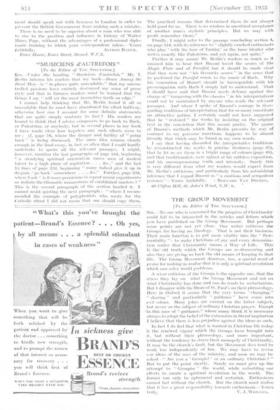"MUSICIENS d'AUTREFOIS
[To the Editor of TOE: SPECTATOR.] Sui,--ITnder :the heading " Musieicns d'autrefois " Mr. I. Berlin informs his readers that my book—Down Anzong the Dead Mcn.-7-11,s." in places quite, unreadable," that my uncoil, trolled passions have entirely destroyed my sense of prose style and that in fairness readers must be warned that the things I say "'wilt set the most insensitive teeth on edge.'' .
I cannot help thinking. that Mr. Berlin found it all so 'unreadable that ]1. must have abandoned the effort halfway, oticrw'isc flow" „HI I ace6ont for some definite statements that are quite simply contrary to fact ? His readers are bound to think that I advise composers to go back to Bach, or PaleStrina,' or anybody, but in several places in my book I have made clear how hopeless any such efforts WOO to 111(' ; t.f. page 76, where the danger and futility of " going back '' is being discussed, . The same idea returns clearly enough in the final, essay, in fact so. often that I could hardly undertake to quote all ti relevant passages. I might, howeN er, mention the last paragraphs of page 214, beginning a steadying spiritual orientation raises men of Modest talent to a high plane of aspiration . . . &c.," and the laSt 35 lines of page 252, beginning " Many indeed giVe it up in despair, go back ' somewhere . . &c." Furl her, page. 258, Nvitere I ask " is it more pernicious to repeat recent experiments ur a le the id lomat ie mannerisms 'of established masters ? 'This is the second paragraph of the section headed 8. cannot resist quoting the next paragraph : " where I recom mended the example of polyphonists who wrote for the Catholic ritual I did, not mean flint one should,copy themp
The practical reasons that determined them do not always hold good for us. . There is no wisdom in uncritical acceptance of another man's stylistic principles. But we may with profit' remember them." •
Finally, I might refer to the passage concluding section 4, on page 218, with its reference to " slightly cracked enthusiasts who play '-with the bow of Tartini,' or the lame idealist who writes exactly like Palestrina, and yet again, not quite."
Further it may amaze Mr. Berlin's readers as much as it amazed him to .hear that. Busoni loved the scores of The Magic Flute and of Parstfai, but it should be ..made elear that they were not " his favourite scores " in the .sense that he preferred the. Parsifal music to the music of .Bach. why his veneration ..of Mozart shoukl be incompatible with him
•
preoccupation. with Bach I simply fail to understand. That
I should have said that. Busoni needs defence against the
charge of" tampering wi Hit lie classics " h is interpret al ions could not be ma halliard by anyone who reads the relevinit passages. And where I spoke of Busoni's courage in disre- garding traditions of interpretation that for so many cons.I it rte an attrael•ive patina, I certainly could; riot have suggested that he " restored " the works by insisting on the .original text in the conviction that.this meant purity. The praise of Busoni's methods which Mr. Berlin presents by any of contrast to my perverse assertions happens to be almost literally that which may be found in my own words.
I say -that having discarded the interpretative traditions he reconstructed the works in pristine freshness (page 87), that be let us see thew. in a bright range of C4)14)1117ti (page 88), and that traditionalists were aghast at his ruthless exposition, and his uncompromisiog truth and intensity. Surely this is very different from what my readers would expect from Mr. Berlin's crit icisms, and particularly from his astonishing inference'that 1 regard Busoni as " a cautious and scrupulous






























































































 Previous page
Previous page